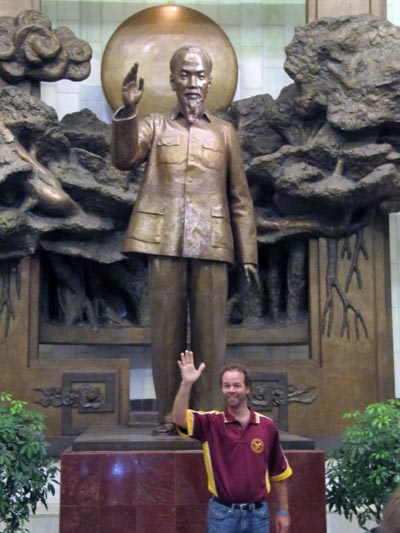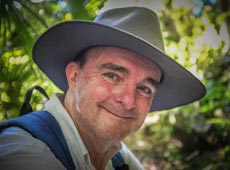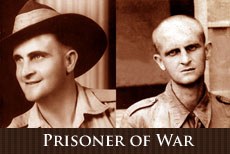
Cameron Paterson with Ho Chi Minh
Welcome to the very first Friday Follow Interview. This week our guest is Cameron Paterson. I feel very happy and honoured that Cameron agreed to be part of this new venture and I hope his gesture will encourage other members of my connected network will raise their virtual hand to be a part of this regular Friday extravaganza. Let’s begin this week’s interview with Cameron…
Brief biography
Finished school, travelled overseas, worked in a pub, studied history and politics, fell into teaching and felt like I was home. Taught in Canberra, then 16 years at Shore in Sydney, last four as Director of Learning & Teaching. Future Summit Leadership Award, Premier’s History Scholarship, NSW Quality Teaching Award, HTA Fellowship. Currently living in USA, completing fourth Masters degree and working in teacher education.
Describe the role played by social media in education
Often educational technology reinforces teacher-directed blah (IWBs, ppt) or the ‘crayola curriculum’, colourful activities with limited learning. The value of social media is in building relationships and facilitating rapid information distribution. Wikis are useful spaces for collaborative writing, blogs provide a global public audience, hosted forums give all students a voice without the pressure of real-time conversation, and video sharing emphasises visual representation (I believe that all history students should be taught how to produce a documentary).
I tried to use Twitter with a Year 10 class last year. They responded weekly with four tweets: the most important thing they had learned, one key question they had, one useful link, and one response to a classmate. It was interesting and the students enjoyed it, but it was an artificial connection and the impact on student learning was negligible. I came across the phrase ‘creepy treehouse’ a few months ago, a place built by scheming adults with the intention of luring in kids. Kids sense that there is something creepy about it and avoid it. This explains why so many teachers’ attempts to use Facebook for educational purposes have fallen flat. Teachers trying to be too cool with social media can be plain…creepy.
Tell me about your relationship with social media. How do you feel about social media?
I set up a Facebook account in 2007, figuring that I had to get into the space in order to understand it. I seldom use Facebook and when I do it is only for social/friend/family connections. I started a blog two years ago and it is pretty awful. I find it enormously challenging to develop the discipline necessary to write for it. I experimented with a class wiki last year but have not made the best use of its affordances.http://shorehistory.wikispaces.com/
I use diigo to store useful teaching ideas. I set up a Twitter account in 2009 and I usually check it daily for professional insights and ideas. I believe that all teachers should be building global networks and openly sharing ideas. When professional development becomes something that you do to yourself rather than something that is done to you, a whole different world opens up. Using technology to deliver information is old hat. Using technology to build relationships and connections is where the real value now lies. While I am often a lone voice against the status quo in my workplace, the collaborative dynamics of participating in #edchat on Twitter with like-minded colleagues can be powerful and reaffirming.
What do you feel are your strengths?
My good looks, my extraordinary IQ, and my biceps. More seriously, probably my relaxed nature. Professionally, I am an innovative forward thinker.
What advice do you like to share with people?
My favourite quote is “Learning is a consequence of thinking” from David Perkins at Harvard. Studying with Eleanor Duckworth I have become fond of her idea that the best teaching is when learners do the explaining and teachers do the listening.
Are there any questions you would like to ask?
- The biggest structural problem schools face is teacher isolation. What innovative ideas do your followers have to address this?
- Teaching is increasingly concerned with testing and accountability at the expense of learning. How can educators develop the political and moral will to challenge this?
- And lastly, if you were responsible for a new history textbook series for the Australian curriculum, what would a really good title for the series be?
Cameron’s blog: It’s About Learning. Subscribe to Cameron’s blog via RSS.
Cameron’s Twitter account: @cpaterso
Thank you Cameron. I am impressed with the breadth and depth of your responses. Readers, please make the time to comment on Cameron’s informative observations and we would appreciate responses to his questions. I myself shall respond in the coming days. Stay tuned for next week’s Friday Follow Interview.








Recent Comments